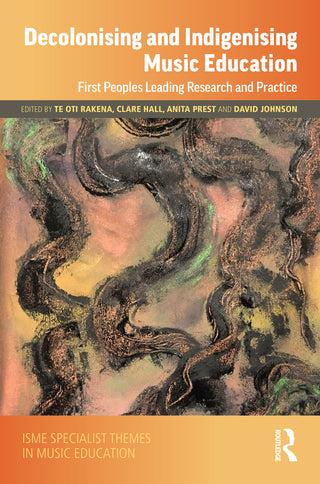Decolonising and Indigenising Music Education : First Peoples Leading Research and Practice
- Unit price
- / per
-
Author:RAKENA Te Oti / HALL Clare / PREST Anita
-
ISBN:9781032265766
-
Publication Date:June 2024
-
Edition:1
-
Pages:160
-
Binding:Hardback
-
Publisher:Routledge
-
Country of Publication:USA


A Back Order button means that we don’t have the book in stock at our store. It may already be on order – or we can order it for you from a publisher or distributor at no additional cost.
As we source items from around the globe, a back-order can take anywhere from 5 days to several weeks to arrive, depending on the title.
To check how long this might take, you’re welcome to contact us and we can provide an ETA or any other information you need. We recommend checking the timeframe before committing to an online order.
Decolonising and Indigenising Music Education : First Peoples Leading Research and Practice
- Unit price
- / per
-
Author:RAKENA Te Oti / HALL Clare / PREST Anita
-
ISBN:9781032265766
-
Publication Date:June 2024
-
Edition:1
-
Pages:160
-
Binding:Hardback
-
Publisher:Routledge
-
Country of Publication:USA
Description
Centring the voices of Indigenous scholars at the intersection of music and education, this co-edited volume contributes to debates about current colonising music education research and practices, and offers alternative decolonising approaches that support music education imbued with Indigenous perspectives. This unique collection is far-ranging, with contributions from Chile, New Zealand, Australia, Canada, Malaysia, India, South Africa, Kenya, and Finland. The authors interrogate and theorize research methodologies, curricula, and practices related to the learning and teaching of music. Providing a meeting place for Indigenous voices and viewpoints from around the globe, this book highlights the imperative that Indigenisation must be Indigenous-led.
The book promotes Indigenous scholars' reconceptualisations of how music education is researched and practiced with an emphasis on the application of decolonial ways of being. The authors provocatively demonstrate the value of power sharing and eroding the gaze of non-Indigenous populations.
Adding product to your cart
You may also like
A Back Order button means that we don’t have the book in stock at our store. It may already be on order – or we can order it for you from a publisher or distributor at no additional cost.
As we source items from around the globe, a back-order can take anywhere from 5 days to several weeks to arrive, depending on the title.
To check how long this might take, you’re welcome to contact us and we can provide an ETA or any other information you need. We recommend checking the timeframe before committing to an online order.
You may also like
You may also like
-
Centring the voices of Indigenous scholars at the intersection of music and education, this co-edited volume contributes to debates about current colonising music education research and practices, and offers alternative decolonising approaches that support music education imbued with Indigenous perspectives. This unique collection is far-ranging, with contributions from Chile, New Zealand, Australia, Canada, Malaysia, India, South Africa, Kenya, and Finland. The authors interrogate and theorize research methodologies, curricula, and practices related to the learning and teaching of music. Providing a meeting place for Indigenous voices and viewpoints from around the globe, this book highlights the imperative that Indigenisation must be Indigenous-led.
The book promotes Indigenous scholars' reconceptualisations of how music education is researched and practiced with an emphasis on the application of decolonial ways of being. The authors provocatively demonstrate the value of power sharing and eroding the gaze of non-Indigenous populations.
-
-
Author: RAKENA Te Oti / HALL Clare / PREST AnitaISBN: 9781032265766Publication Date: June 2024Edition: 1Pages: 160Binding: HardbackPublisher: RoutledgeCountry of Publication: USA
Centring the voices of Indigenous scholars at the intersection of music and education, this co-edited volume contributes to debates about current colonising music education research and practices, and offers alternative decolonising approaches that support music education imbued with Indigenous perspectives. This unique collection is far-ranging, with contributions from Chile, New Zealand, Australia, Canada, Malaysia, India, South Africa, Kenya, and Finland. The authors interrogate and theorize research methodologies, curricula, and practices related to the learning and teaching of music. Providing a meeting place for Indigenous voices and viewpoints from around the globe, this book highlights the imperative that Indigenisation must be Indigenous-led.
The book promotes Indigenous scholars' reconceptualisations of how music education is researched and practiced with an emphasis on the application of decolonial ways of being. The authors provocatively demonstrate the value of power sharing and eroding the gaze of non-Indigenous populations.
-
Author: RAKENA Te Oti / HALL Clare / PREST AnitaISBN: 9781032265766Publication Date: June 2024Edition: 1Pages: 160Binding: HardbackPublisher: RoutledgeCountry of Publication: USA
-



